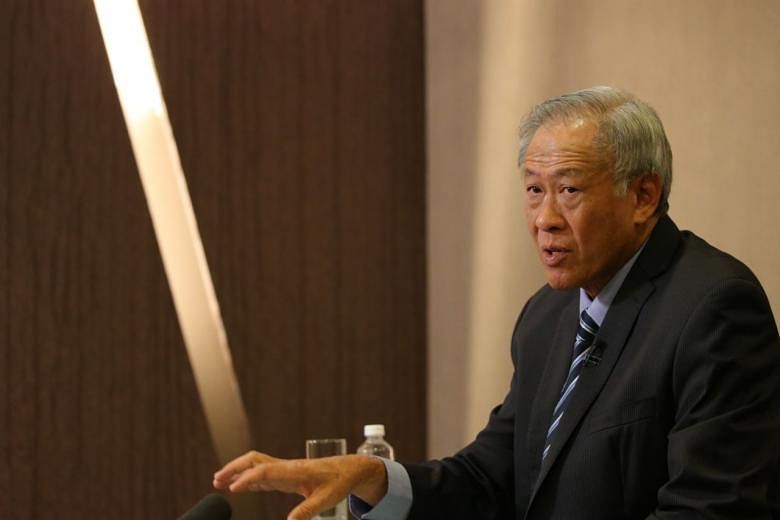SINGAPORE - Singapore hopes that Asean countries will be able to agree on a code to manage unexpected encounters in the air by October this year, a move that it says will help manage security threats arising from territorial disputes in the South China Sea.
This code of unexpected encounters (CUES) will reduce the risk of miscalculation and mishaps, and provide measures for de-escalation should they occur, said Defence Minister Ng Eng Hen on Wednesday (Feb 7).
Dr Ng, who was speaking to the media a day after the Asean Defence Ministers' Meeting (ADMM) Retreat at the Changi Exhibition Centre, gave journalists a summary of what Asean defence chiefs had discussed during the two-day retreat.
Singapore is chairing the ADMM this year, a key platform for dialogue on regional security issues.Singapore also chairs the ADMM-Plus, which was formed in 2010 and comprises the 10 Asean countries plus eight key partners for the grouping: Australia, China, India, Japan, New Zealand, South Korea, Russia and the United States.
One key area discussed by the defence ministers on Tuesday (Feb 6) was developing a set of protocols to manage unexpected encounters, even as Asean member states and China begin negotiations on a separate binding code of conduct (COC) to manage tensions in the disputed waters.
Four Asean members - Brunei, Malaysia, the Philippines and Vietnam - and China have overlapping claims in the South China Sea, where military installations have been built in recent years.
There already exists a CUES to manage such unplanned encounters at sea - this was adopted by ADMM-Plus countries last year - but a similar set of protocols for aircraft is just as important, said Dr Ng.
Dr Ng said: "For military aircraft, what happens if despite all the negotiations, two planes from opposite sides, or two or more sides, suddenly meet each other in mid-air, or at sea - what do you do? You make a miscalculation, you can have a security incident of enormous impact."
He added that Asean's defence ministers were unanimous in wanting to work towards such a code for such encounters in the air, but it would be challenging to get all 18 ADMM-Plus countries to agree on such a code, by October, when the formal ADMM and ADMM-Plus meetings will be held.
"If we do, I think that will build confidence, that even as we negotiate the code of conduct, that there are measures in place which will reduce the risk of any mishaps or miscalculation," he said.
When asked whether the defence ministers had discussed Chinese activity in the South China Sea, where it has built islands and military bases, Dr Ng said the ministers discussed "confidence-building measures", and noted that all claimants carried out such activity in the area to various extents.
He said also that Singapore was not a claimant state and "really don't want to get involved in what belongs to whom, because it is not our place to say", adding that there are platforms and institutions that can make a deterministic outcome.
After the ADMM Retreat on Tuesday (Feb 7), Asean defence chiefs also had an informal meeting with Chinese Minister of National Defence Chang Wanquan, who is in Singapore for an introductory visit.
During the meeting, Asean defence ministers had said China was an indispensable member to stability and progress in the Asia-Pacific region, said Dr Ng.
"There was a clear recognition that China is not only needed, it is also indispensable and a key partner, so this engagement of China would have to be stepped up, would have to continue," said Dr Ng.
One of the practical ways that this is being done, is by conducting an inaugural Asean-China maritime exercise by the end of this year.
"Both China and Asean gave their full support for this so we will work out the details," said Dr Ng, adding that Singapore has a very heavy plate for its chairmanship year.
The Asean defence ministers also discussed on Tuesday (Feb 7) efforts to counter terrorism, where they issued a joint statement on the issue, and supported a framework proposed by Singapore - manage efforts to build resilience, respond to the threat and recover from an attack.
They also discussed building a network of experts that can help in responding to possible nuclear attack, or a dirty bomb set off by terrorists, said Dr Ng.
.


